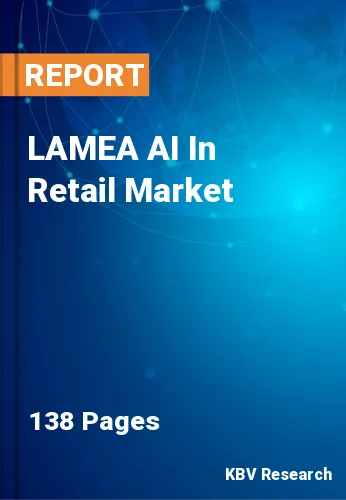The Latin America, Middle East and Africa AI In Retail Market would witness market growth of 27.0% CAGR during the forecast period (2022-2028).
Retailers may improve inventory management by gaining a full understanding of their stores, customers, and items by linking more aspects of their operations and implementing AI. Smart shelves are used in another sort of AI inventory management to detect pricing problems and out-of-stock items right away.
For more current inventories, inventory robots can warn personnel of low stock or missing items. Additionally, checkout systems with computer vision capabilities can immediately reduce product loss. As a result, merchants can manage stores more effectively and free up the time of associates to concentrate on elevating the shopping experience for customers.
The demand for monitoring and surveillance at physical stores, the rise in smart gadgets, and government regulations favoring digitization are all contributing causes to the expansion. The use of AI in the retail sector is based on how firms have conducted business in the last few years. Digital businesses need big data, analytics, and AI because they can revolutionize everything from consumer experiences to business operations.
The South African retail industry is well-established and is still growing in other African nations. According to the Foreign Agricultural Service of the United States Department of Agriculture, retail food sales in South Africa reached $40 billion in 2021, a 0.2% gain from 2020 as the country's economy started to recover from the COVID-19 pandemic's consequences. The expansion came after COVID-19 laws were relaxed and in-store shopping rates increased.
The Brazil market dominated the LAMEA AI In Retail Market by Country in 2021, and would continue to be a dominant market till 2028; thereby, achieving a market value of $378.9 million by 2028. The Argentina market is experiencing a CAGR of 27.6% during (2022 - 2028). Additionally, The UAE market would showcase a CAGR of 26.6% during (2022 - 2028).
Based on Technology, the market is segmented into Machine Learning, Natural Language Processing, Chatbots, Image & Video Analytics, and Swarm Intelligence. Based on Sales Channel, the market is segmented into Omnichannel, Brick & Mortar, and Pure-play Online Retailers. Based on Component, the market is segmented into Solution and Services. Based on Application, the market is segmented into Customer Relationship Management (CRM), Supply Chain & Logistics, Inventory Management, Product Optimization, In-Store Navigation, Payment & Pricing Analytics, and Virtual Assistant. Based on countries, the market is segmented into Brazil, Argentina, UAE, Saudi Arabia, South Africa, Nigeria, and Rest of LAMEA.
Free Valuable Insights: The Global AI In Retail Market is Predict to reach $24.1 Billion by 2028, at a CAGR of 24.4%
The market research report covers the analysis of key stake holders of the market. Key companies profiled in the report include Intel Corporation, Salesforce.com, Inc., NVIDIA Corporation, Amazon Web Services, Inc. (Amazon.com, Inc.), Google LLC, IBM Corporation, Microsoft Corporation, Oracle Corporation, SAP SE, and ViSenze Pte Ltd.
By Technology
By Sales Channel
By Component
By Application
By Country
Our team of dedicated experts can provide you with attractive expansion opportunities for your business.

